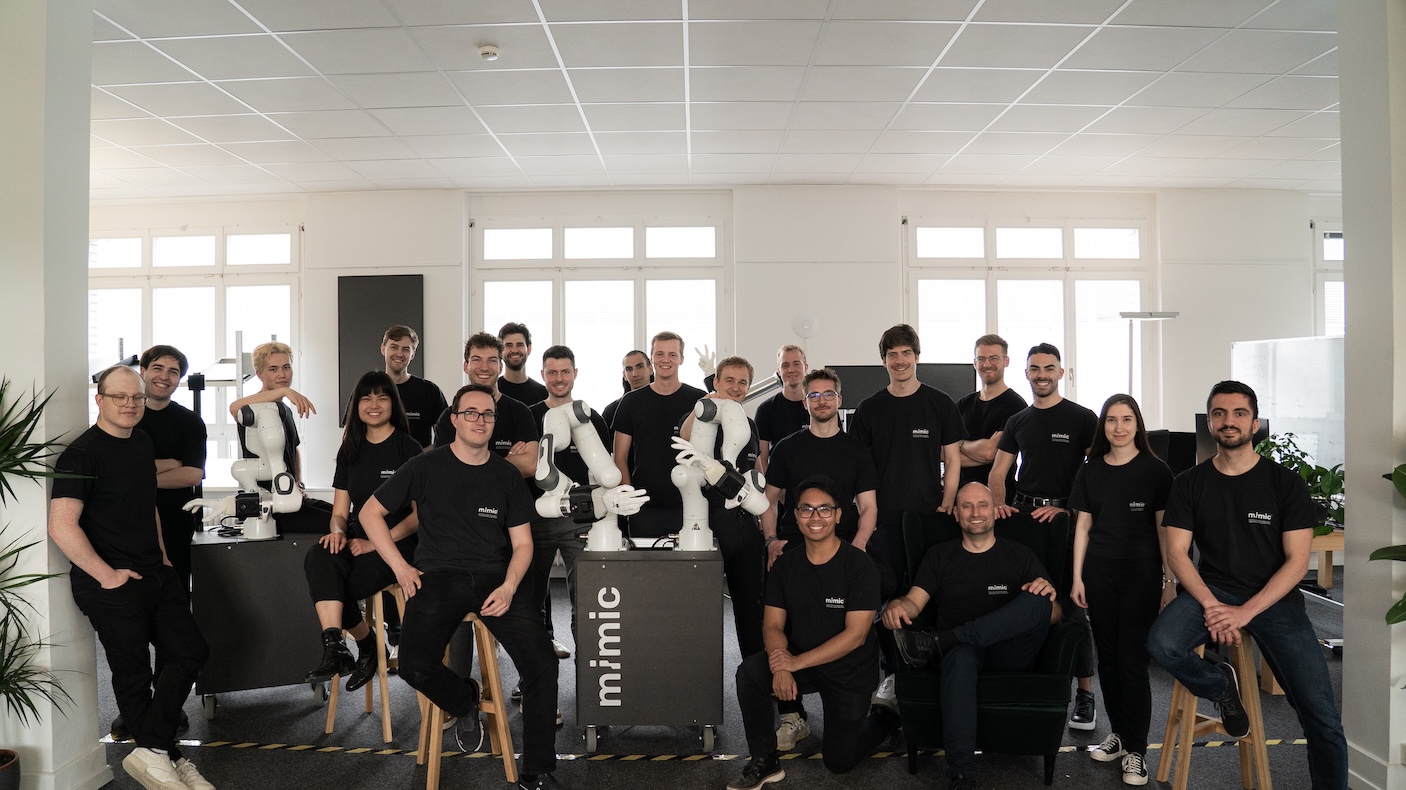Future of AI | How and Why Speedinvest is Investing in AI
“We seek to invest in early stage Artificial Intelligence (AI) start-ups in Europe with the potential to disrupt the industry and achieve high growth. We believe in the growing potential of AI and its ability to create value for users, businesses, and the economy. We will focus on companies that have a clear competitive advantage and a scalable business model. We will also look for founders with a strong vision and commitment to their product, as well as the ability to execute and scale their business. We believe that investing in the early stages of AI start-ups in Europe can create attractive returns for our fund.”
I apologize if some of your brain cells atrophied while you read that, but I wanted to hit two birds with one stone. First, to illustrate that posts on this topic are often entirely flavorless. Second, an AI post wouldn’t be complete without a demo. Open AI’s GPT3 wrote the above paragraph.
(If you haven’t tried chatGPT, please have a go. I’ll wait. Even if you’ve scrolled through endless screenshots of it on social media, let me assure you that the visceral experience of interacting with this AI is worth it.)
The AI did a good job in the sense that all of the above is true and accurate. Unfortunately, none of it is interesting. The reality is that saying you are a VC that invests in AI is a bit like saying that you are a VC that invests in software. The above paragraph is so boring that I can’t even bring myself to cringe at the cliche.
We have six investment teams at Speedinvest that cut across multiple verticals and look at all layers of the stack when it comes to early-stage AI startups, from new applications of fundamental research in health to efficient MLOps for the most demanding financial institutions. Our Deep Tech, SaaS & Infra, and Climate Tech and Industrial Tech teams have been especially active in this space with 13, 6, and 6 investments, respectively. You can dive deeper into those sectors below.
So you see, we really do ‘Invest in AI.’ But to avoid the bland statements of the opening paragraph, I’ll recommend that you peruse the individual sections written by our investment teams.
As for a general overview on how we perceive AI, I will leave you with one final thought:
AI is advancing faster than you think.
I mean it, even if you already think it’s changing fast and you fancy yourself an expert. And while you reconsider the headline-grabbing events of the last year, keep in mind that everything feels obvious in hindsight. Could you really have predicted:
- the proficiency of ChatGPT?
- the success of diffusion based text-to-image models such as Stable Diffusion?
- Microsoft investing $10 billion in OpenAI and Google committing $300 million to its rival Anthropic?
In light of this, I predict that if you come back to this post later in the year, the details will already feel dated. If you want actual predictions though, head to a prediction market, like Metaculus. If that sentence didn’t make sense, I recommend checking out Superforecasting.
Our AI Deal Flow
As one of Europe’s most-active AI investors, we receive pitches from founders across the continent on a daily basis, and our AI deal flow routinely increases year on year. In 2020 alone, for example, we saw a 38 percent increase from 2019 and a 100 percent increase from 2018.
The majority of pitches over the past five years have come from the UK, Germany, and France, in that order, followed by Switzerland and Finland.

And we continue to see AI startups from all six of our core sectors represented in our deal flow, with our SaaS & Infra, Deep Tech, Climate and Industrial Tech teams receiving the most pitches, followed closely by Fintech, Health, and Marketplaces & Consumer.
Below is a sector-focused breakdown of how we’re pursuing AI at Speedinvest.
Deep Tech
As deep tech investors, our team has been reviewing AI-related pitches for a long time and we’ve seen the space shift through multiple technology paradigms and business models. Now more than ever, we are looking for companies that pair their breakthroughs with a strong product offering.
Here are some examples of technologies that we’ve been tracking for a long time before making an investment into a strong team:
- Solvo applies cutting-edge reinforcement learning to solve real problems in supply chains. A technology that made headlines with its exceptional. performance in games but took a long time to break out into the real world.
- Boltzbit was our first investment into generative AI and foundation models, before the generative AI wave took over the headlines.
- text.cortex is building a generative AI platform for text creation powered by hundreds of specialized NLG models.
We also see topics such as ethics, privacy, and safety playing a crucial role in the development of the AI landscape. We have made many investments along these themes already:
- Tenyks is an MLOps platform that efficiently validates computer vision models with cutting edge failure analysis
- Bitfount is a federated learning platform. It allows organizations to put privacy first by enabling distributed data analysis without the need to actually share data.
- Pimloc has productised privacy preserving AI technology for analyzing images and video.
We think that our ability to safely control AI is crucial in capturing the value of this rapidly advancing technology. In our opinion, Conjecture is the most important European AI startup of 2022. Unfortunately, it’s also currently the most underfunded area of AI. Expect to see exciting investments by us in this space. –– Evgeny Slavin, Senior Associate at Speedinvest
Fintech
Artificial intelligence has the potential to revolutionize the financial industry in both B2B and B2C segments, by automating many manual processes, reducing costs, and improving the overall customer experience. Financial services companies should adopt AI solutions to make faster, more informed decisions, and detect and prevent financial crimes, such as money laundering and fraud.
The development of AI solutions will also be beneficial to consumers. From smoothing customer service interactions to empowering individual investors, the consumer will benefit from an unprecedented level of financial literacy, security, and service.
The AI layer cannot and should not be neglected when it comes to building the financial services and products of tomorrow. There are many applications to it, but below are the four topics our fintech team is particularly excited about:
- Fraud detection: AI algorithms can analyze large amounts of data to identify and flag suspicious transactions, helping financial institutions to detect and prevent fraud more efficiently.
- Risk management: AI can be used to analyze financial data to identify and manage risk, for example by identifying patterns that indicate a high risk of default on a loan.
- Personalized financial advice: AI algorithms can be used to analyze a person's financial situation and provide personalized financial advice, such as investment recommendations or budgeting tips.
- Automating customer service: AI-powered chatbots can be used to automate customer service interactions, allowing financial institutions to handle a high volume of customer inquiries more efficiently.
As with any emerging technology, there will be challenges to overcome, such as regulation, data privacy, and ethical considerations. Moreover, creating trust in AI-generated financial products and services may be difficult and it may take time for the industry and customers to fully adopt the technology.
On the Fintech team, we’re looking forward to helping bold founders tackle these topics, notably the ones that will help connect the old world to the new world. Because we will face challenges related to integration with legacy systems, data availability, and quality. –– Alexis Majos, Senior Associate at Speedinvest
Health
Healthcare systems around the world are struggling to address the growing demand for their services. We believe now is the time to put our huge, silo-ed healthcare datasets to work, to discover and get treatments to market faster, and improve patient outcomes and care delivery, with the help of regulated AI tools.
Here are some illustrations of wide-ranging AI applications across the entire healthcare value chain:
- Research and Innovation: We are excited about AI tools that can accelerate research with faster drug screening, replacement of control groups in trials with synthetic data, and treatment response predictions in specific indications.
- Diagnostics: We are seeing a large number of AI and generative AI tools that can detect new disease biomarkers, and patterns and annotate medical images to provide decision support to clinicians and treatment efficacy data for pharma.
- Care delivery: We believe that AI can improve care delivery and reduce costs, by automating routine tasks such as filling in patient information, analyzing electronic health records (EHRs), matching patients to the right trial, and planning transportation/logistics.
- Forecasts: AI can be used to improve hospital capacity planning and resource allocation through the prediction of public health and patient health outcomes, readmission risks, and maintenance of medical equipment.
Our health team has seized this opportunity by partnering with incredible startups on the intersection of healthcare and AI. Seqera Labs, a data orchestration/workflow software provider, has built an infrastructure for many AI pioneers in life sciences to operate at scale, IOMED is developing NLP tools for hospitals with an ambition to become the worldwide reference in healthcare data access, and ThinkSono, democratizes point-of-care ultrasound via real-time AI-guidance.
We’re excited to see the next generation of AI startups in healthcare. We also hope to see more collaborative efforts across the following:
- Co-developments between innovators and healthcare teams: In a survey by McKinsey, only 14 percent of AI healthtech founders used the input of healthcare professionals in the early design phases. We like to see a clear focus on adoption and distribution from the start as this has been a huge pain point for any AI/ML tools in healthcare so far.
- Emphasis on digital education for the workforce: Skills, such as basic digital literacy, genomics, AI, and machine learning need to become mainstream for all future practitioners. In addition, healthcare systems need to think about the existing workforce and incentivize digital education.
- Strengthening data quality, governance, security, and interoperability: It's critical to digitize current systems and data in place before embarking on AI deployments, with compliant data-sharing policies supporting the use of AI. Then, healthcare systems need to support efforts to anonymize, link data, and build an interconnected data infrastructure for different stakeholders.
–– Estelle Botbol, Associate at Speedinvest
Climate Tech and Industrial Tech
Spending most of our time evaluating climate tech, industrial tech, and B2B climate companies, our Climate Tech and Industrial Tech team sees AI becoming an ever more important instrument in the toolbox of product engineers and developers. In both cases, teams have to deal with vast amounts of data and oftentimes complex root-cause relationships. AI, if implemented correctly, can represent unseen capabilities in terms of data handling, automation, and analysis. We are particularly excited about the wide range of possible applications for this technology
So it’s no surprise that many investments in our portfolio are already leveraging intelligent algorithms as a key pillar for their product functionality. Greyparrot uses cutting-edge, AI-based computer vision systems to monitor, analyze, and sort waste flows at scale. TWAICE combines deep battery knowledge and artificial intelligence to help companies working with batteries to eliminate risks and generate actionable insights at every step of the battery life cycle. And Celus uses AI to automate manual steps in the engineering process to reduce development times by up to 90 percent.
For our investment decision making, we are particularly looking out for the specific moat that AI is bringing to the product in question. With the sustained hype around the technology, founders and product teams should always ask themselves, “For our mission, can AI be a real game changer?” versus “Is it a nice addition?” If your answer is not clear or even the latter, put it on hold or first find a clear reason for taking up the effort to develop AI.
All in all, we believe that the true power of AI will only reveal itself in the coming years. But today’s early efforts already give a glimpse of how profoundly it will accelerate and improve software. –– Leo Schmid, Senior Associate at Speedinvest
Marketplaces & Consumer
We believe that Generative AI especially has the potential to enable consumers and companies across the world to benefit from services and products that would normally require higher investments, with easier access to tailored education being one of the biggest benefits for society. Language Learning will change drastically through AI because the frequency of personal interactions needed to level up can be replicated by an AI assistant. Tailored content generation, matchmaking, and labeling on marketplaces/platforms will increase the liquidity on both sides and lead to a higher number of transactions.
Overall we love to focus on companies that are creating amazing experiences for the end consumer or facilitate the trade of platforms and marketplaces in a new way. We see the role of AI in this context more as a facilitator and therefore look forward to meeting companies that are able to create new forms of interaction, labeling, and matching on user-centric products or platforms.
While the hype around AI is back on full speed, our Marketplaces & Consumer team tends to be more interested in companies that are not exposed, and therefore vulnerable, to rapid changes in the tech stack but remain flexible on the underlying technologies and are able to add value adding layers on top. –– Maximilian Wilhelm, Associate at Speedinvest
SaaS & Infra
A new emerging tech stack is forming around Generative AI (GAI). Many SaaS companies are rushing into the space adding Generative AI to their product, ranging from building AI-native applications to vertical solutions, infrastructure and tooling. We see that real value is accruing in real markets and it’s happening extremely fast with models, like stable diffusion and ChatGPT growing exponentially. Every SaaS company will integrate Generative AI in some sort of form, however, it’s too early to tell what will be the winning strategy given the lack of strong product differentiation as everyone is using very similar models.
Companies and platforms that are already established and own the distribution will be the ones profiting the most from the first wave of Generative AI. Companies building GAI native applications will likely grow quickly given that there are little technical moats. So far we’ve seen extremely fast growing product categories in copywriting, image generation, and code generation, exceeding tens of millions of annual recurring revenue in a short time frame.
Growth alone will not be enough to build a long-lasting business and it will come down to retention and product differentiation. Here’s what we’ll be looking for from AI startups in Saas & Infra:
- Application layer (vertical integration): End-to-end applications that integrate Generative AI with a vertical edge, running proprietary models, and data
- Model layer: AI platforms or pre-trained models either offered as a proprietary API or Open Source
- Infrastructure layer: Cloud platforms or infrastructure tooling built around Generative AI
–– Yang Tran, Senior Associate at Speedinvest
Want more updates on our portfolio? Sign up for our monthly newsletter and follow us on LinkedIn.













.svg)
